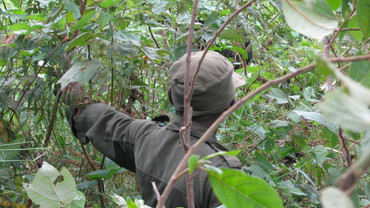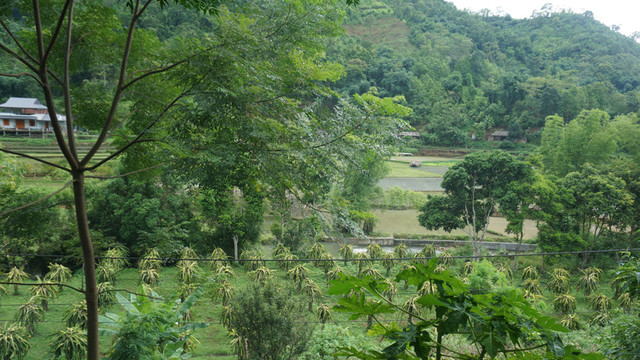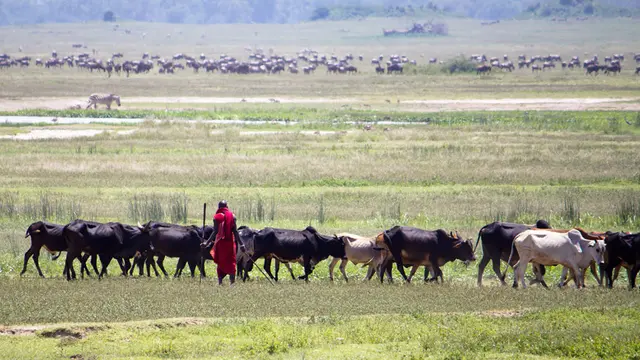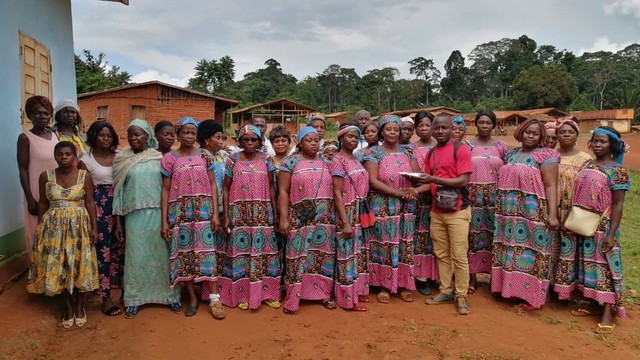Redesigning grant making for locally-led conservation
With funding due to be top of the agenda at this year’s biodiversity and climate negotiations, we share our experiences of applying the principles for locally led adaptation to a conservation funding initiative and call on funders and grant makers to shift their practices to support locally led action for nature and climate alike.


Mushroom planting activities with a group of 10 beneficiaries, Nyamukubi, DRC (Photo: copyright Jean-Marie Mweze Bagunda/Kalehe Arabica Coffee Cooperative)
With support from the Arcus Foundation and as part of the People and Conservation Learning Group (PCLG), in 2023, IIED designed and delivered a small grants initiative to fund links between people and conservation in the great ape range states of Uganda, the Democratic Republic of Congo and Cameroon.
Here, we share the experience of our attempt to embed the locally led adaptation (LLA) principles – developed to ensure that climate adaptation finance is designed and delivered by local actors – into the design of the PCLG small grants mechanism. By sharing these experiences and lessons learned, we aim to start a conversation on how to address the challenges of getting money to the local level.
Applying the LLA principles to conservation
While funders increasingly recognise that locally led adaptation is essential to effective climate action, there is also ample evidence that locally-led action is key to achieving global biodiversity goals and that nature is best conserved when local communities are in charge.
Indigenous Peoples and local communities echo the message that biodiversity finance must reach the local level in the same way as climate finance.
The LLA principles – which include devolving decision making to the lowest appropriate level (principle 1) and easy access to patient, long-term and flexible funding (principle 3) – are essential for local actors, whether they are responding to climate change or biodiversity loss.
Facing the contradiction
As one of more than 120 governments and organisations signed up to the LLA principles, it is crucial that we at IIED put them into practice across all our work. And although they were designed for adaptation, the principles are generic enough to reflect good practice across other types of intervention. This includes the conservation space, which does not always have an explicit focus on adaptation.
When trying to apply the LLA principles to the PCLG small grants initiative, we found an obvious contradiction around principle 3: providing patient and long-term funding to local actors. As an intermediary in the finance delivery chain, we depended on external funding to disburse the small grants; we were also working with a small budget for PCLG, with no guarantee of renewed funding for further years. So, the PCLG fund could only provide one-off small grants to successful applications.
As we could not claim to align the fund fully to the LLA principles, we focused our efforts on a few small changes that could help start a conversation on how a small grants funding mechanism can enable locally-led action.
National champions and easy access
To devolve decision making to the local level, we worked with a national champion in each country; a local representative who understands local priorities relating to great ape conservation. The champions took the lead in publicising the initiative, reviewing applications, deciding with IIED which organisations to fund, and communicating directly with grantees.
We took several steps to enable easier and quicker access to funding, including:
- Inviting proposals in French and English
- Simplifying the application form
- Accepting applications via three platforms (Google form, email and WhatsApp)
- Reducing reporting requirements, and
- Considering mobile money transfers for applicants without a bank account.

Progressive Think Tank community engagement officer Bob Barigye with some of the Batwa elders during the community engagement activity regarding ape conservation, Uganda (Photo: copyright Matte Derrick/Progressive Think Tank)
Lessons learned
We received over 300 applications, nearly one-third in French. So, it is clear that these changes made it easier for applicants to access funding. But many were difficult to implement in practice.
We faced several process challenges. Reviewing proposals in two languages required more time and skills, while compiling the applications from three submission channels was extremely labour-intensive. Using WhatsApp posed unexpected challenges in terms of sharing, saving and processing messages and information; we also received unsolicited calls and messages, even after the funding window had closed.
A payment limit on international money transfers prevented us from using mobile money so, for grantees without a bank account, we had to use cash transfers via the national champion, which was even slower than a normal international bank transfer.
There were also conceptual dilemmas. Despite carefully tailoring the eligibility criteria, we received many applications from organisations that were not locally led, raising questions around how we define ‘locally led’ and how to assess this on an application form.
Our national champions also shortlisted many applications for alternative livelihood initiatives and income-generating activities to reduce threats to great apes. But evidence suggests that such activities are ineffective. This raises a question around how rigidly we should adhere to the LLA principles, if local actors propose an approach that evidence suggests is unlikely to work.
Get in touch!
Despite these hurdles, we continue to look for solutions to these challenges. Changing how we work and how we fund nature and climate initiatives is imperative to enable locally-led action. But we do not have all the answers to the questions raised here.
We therefore want to hear from other funders who have managed funding mechanisms designed to get funding directly to the local level, to find out how you have overcome similar obstacles. We also encourage all organisations to join us in endorsing the LLA principles and embedding them into your ways of working. We challenge you to push the boundaries of your grant making to enable locally-led action.
So, whether you are already getting funding to the local level, would like to find out more, or simply want to stay connected on these issues, please get in touch via smallgrantspclg@iied.org and share your experiences with us.



